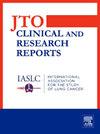Eftilagimod Alpha(一种可溶性 LAG-3 蛋白)与 Pembrolizumab 联合用于抗程序性细胞死亡蛋白 1/程序性死亡配体 1 治疗难治的二线转移性 NSCLC:2 期研究的最终结果
IF 3
Q2 ONCOLOGY
引用次数: 0
摘要
导读:Eftilagimod alpha(efti)是一种可溶性淋巴细胞活化基因-3蛋白,可触发抗原递呈细胞和T细胞(CD4+和CD8+)活化,有助于克服程序性细胞死亡蛋白1或程序性细胞死亡配体1(PD-(L)1)抑制剂的耐药性。方法在抗PD-(L)1一线治疗确诊进展后,患者接受依夫替(30 毫克,每2 周皮下注射一次,8 个3 周周期,然后每3 周注射一次,最多54 周)和pembrolizumab(200 毫克,每3 周静脉注射一次,最多105 周)治疗。主要终点是根据修订后的实体瘤免疫疗法反应评估标准1.1版得出的客观反应率。次要终点包括疾病控制率、无进展生存期、总生存期(OS)和耐受性。探索性终点包括肿瘤生长动力学和预定义亚组分析。对程序性细胞死亡配体1肿瘤比例评分进行集中评估。结果从2019年4月到2021年8月,采用西蒙两阶段设计入组了36名患者。大多数患者(81.8%)的PD-(L)1肿瘤比例评分较低或为阴性(<50%)。所有患者的一线治疗均以抗PD-(L)1为基础,66.7%的患者联合化疗。确诊客观反应率和疾病控制率分别为8.3%和33.3%。中位无进展生存期为2.1个月,中位OS为9.9个月。PD-(L)1高表达或对PD-(L)1抑制剂获得性耐药的患者显示出更优越的反应和生存结果,而OS与疾病控制密切相关。结论Efti加pembrolizumab对PD-(L)1抑制剂耐药的NSCLC患者耐受性良好,并显示出抗肿瘤活性迹象,值得进一步研究。试验注册号:NCT03625323:NCT03625323。本文章由计算机程序翻译,如有差异,请以英文原文为准。
Eftilagimod Alpha (a Soluble LAG-3 Protein) Combined With Pembrolizumab in Second-Line Metastatic NSCLC Refractory to Anti–Programmed Cell Death Protein 1/Programmed Death-Ligand 1-Based Therapy: Final Results from a Phase 2 Study
Introduction
Eftilagimod alpha (efti), a soluble lymphocyte activation gene-3 protein, triggers antigen-presenting cell and T-cell (CD4+ and CD8+) activation and helps overcome resistance to programmed cell death protein 1 or programmed cell death-ligand 1 (PD-(L)1) inhibitors. We assessed efti plus pembrolizumab in second-line anti–PD-(L)1-refractory metastatic patients with NSCLC.
Methods
After confirmed progression on anti-PD-(L)1-based first-line therapy, patients received efti (30 mg subcutaneously every 2 weeks for eight 3-week cycles and then every 3 weeks for up to 54 weeks) plus pembrolizumab (200 mg intravenously every 3 weeks for up to 105 weeks). The primary endpoint was the objective response rate by modified Response Evaluation Criteria in Solid Tumors version 1.1 for immune-based therapies. Secondary endpoints included disease control rate, progression-free survival, overall survival (OS), and tolerability. Exploratory endpoints included tumor growth kinetics and predefined subgroup analyses. Programmed cell death-ligand 1 tumor proportion score was assessed centrally.
Results
Thirty-six patients were enrolled from April 2019 to August 2021 using Simon’s two-stage design. Most patients (81.8%) had low or negative (<50%) PD-(L)1 tumor proportion score. First-line therapy was anti–PD-(L)1-based for all patients, combined with chemotherapy for 66.7%. The confirmed objective response and disease control rates were 8.3% and 33.3%. The median progression-free survival was 2.1 months and the median OS was 9.9 months. Patients exhibiting high PD-(L)1 expression or acquired resistance to PD-(L)1 inhibitors revealed superior response and survival outcomes, and OS was closely correlated with disease control. No treatment-emergent adverse event led to permanent discontinuation of study treatment.
Conclusions
Efti plus pembrolizumab was well-tolerated and revealed signs of antitumor activity in patients with NSCLC resistant to PD-(L)1 inhibitors, warranting further investigation. Trial registration number: NCT03625323.
求助全文
通过发布文献求助,成功后即可免费获取论文全文。
去求助
来源期刊

JTO Clinical and Research Reports
Medicine-Oncology
CiteScore
4.20
自引率
0.00%
发文量
145
审稿时长
19 weeks
 求助内容:
求助内容: 应助结果提醒方式:
应助结果提醒方式:


